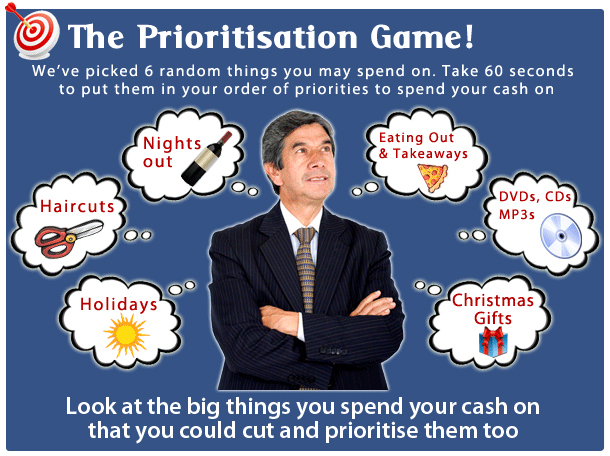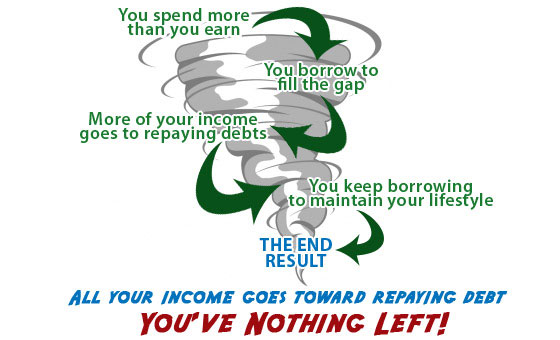Sometimes waving a MoneySaving magic wand and changing all providers isn�t enough, two further simple words are needed... Stop Spending. Whether you need scaring or tips, want mantras or help cutting back, Martin's guide and the frightening Demotivator tool will help tackle those spending demons.
Cut Your Bills Checklist
Need scaring into this?
I met a good middle-class family for a media money makeover. First, they admitted shame at �60,000 credit-card debt, a sum that mathematically would take them two years of after-tax income to repay even if they�d no bills to pay, or food to buy.
Yet what they initially hid from me, and themselves, was a further jaw-dropping �120,000 of their mortgage had originally been splurged on plastic then shifted onto the home loan.
That�s �180,000 overspending in less than a decade, yet these weren�t obviously profligate folk � like many, they�d simply stumbled into the trap of wrongly believing they were wealthy and tried to give their family the best. Inevitably, solving such gargantuan financial indiscipline just takes two simple words....
Yet that�s easy to say and a nightmare to do; yet in their case an abrupt spending defibrillation was the only way. To get them back on track, they need to simply vow not to lay out for anything barring food, heat and essential bills. For most people that's unnecessary, but get it wrong and things can get that bad.
Surely it's only a little debt?
Putting a little debt on cards may not seem too bad, yet if it's unplanned and not budgeted for, it's simply willy-nilly overspending, and you�re setting yourself up for a disaster, and not just financially. Too many times I�ve seen the impact debt crisis has on homes, family, mental health and relationships.
You may feel this is over-dramatising; yet when there�s no money left, you can�t borrow more, and the creditors are asking for money back which you�ve no ability to repay, it touches every element of your life.
The danger is what�s called a �debt spiral�. It works like this:
Do you spend more than you earn?
There�s no need to stop spending for the sake of it. If you enjoy a cappuccino, can afford it, aren�t in debt and aren�t overpaying; sup away. Yet as Dickens' Micawber principle states:
"Annual income twenty pounds, annual expenditure nineteen, nineteen six, result happiness. Annual income twenty pounds, annual expenditure twenty pounds ought and six, result misery."
There are two ways to check if you�re spending more than you earn.
-
The BIG danger signal. Are you in debt?
If you are, and can�t answer the question 'what are your debts from?' there�s a problem. If you didn�t buy, for instance, a car or a conservatory, but you've used cards or loans to fill gaps, an ear-piercing alarm should ring.
Debt is fine if it is planned, rational, budgeted for and as cheap as possible; however if you consistently need to use the credit cards to supplement your monthly spend � you have a problem. Do that, and as I�ll explain in a moment, it can have life-destroying consequences. -
Accurately assess your spending.
If you are spending more than you earn, there�s a simple way to accurately check. The specially designed Budget Planner calculates your genuine annual income and then tells you exactly how much more you spend than you earn.
Most people are shocked by the result, as many of those who think they�re within budget month-by-month aren�t when it�s done over a year. This is the start point of sorting out your cash; if possible, sit down and spend the time to do the budget. The planner also then helps you prioritise your spending.
Of course, even if you�re not spending more than you earn, if your aim is to save up for something specific, the techniques below will help too.
The Demotivator: frightening but fun
The Demotivator is special fun tool designed to complement the full Budget Planner that shows you the real impact of discretionary spending.
Simply enter items like cigarettes, daily sandwiches, newspapers and it�ll tell you how much you spend a year, and how long you worked to buy them. Then print out the results and stick it to your wall or fridge as a constant demotivating reminder.
The MoneySavingExpert Demotivator
How to stick within your means
One of the big problems is people ask the wrong questions... in my job as Money Saving Expert people come up to me all the time and ask something like...
"How do I get the shiny new car / glamourous holiday / amazing Christmas / designer clothes I want on my paltry salary?�
It's thinking this way that leads people to constant overspend, because you're totally ignoring the financial reality. Instead the real question's:
"On my paltry salary, what�s the best lifestyle I can possibly have?"
You have to start letting your finances rule your lifestyle, not vice-versa.
Be clinical when assessing yourself
To do this, as noted earlier, the task is to sit down for a brutally frank financial self-assessment. I don�t mean a prissy budget looking at a month�s expenditure. That omits the cost of Christmas, summer holidays, MOT tests and more.
I mean scrutinise everything, big and small, over a year, to prioritise what�s important and cutting anything pushing your spending beyond your income. Use the free Budget Planner tool to do it for you. Yet be warned, it�s the real deal, so set aside two hours and prepare for a sinking feeling when pressing the �Do I spend more than I earn?� button.
Once you know what you've got and what you can spend it on, then you need to find a way to stick to it. An easy way to do this is to use the Piggybanking technique which uses different bank accounts to control your cash flow (if you're in severe debt, also see the the Problem Debts article).
Work out your priorities
If you haven't got enough income to pay for everything you want to, then you've got to work out which ones are the most important to you.
First should come all necessary bills, rent, mortgage, food and clothing, but after that theres wriggle-room for making your own spending decisions.

Top Tips to stop you spending
Anything that checks our impulses can be a kick-butt powerhouse. Early in my career for a telly programme, I was asked to devise a �Martin�s Money Mantra� to do this. Racking my brains for hours to create one simple spending panacea, I failed.
Different scenarios require different approaches, so I ended up with two; each has questions to ask before you buy.
Many people swear by them (some at them), and requested credit card-sized versions, so we designed a free wallet-sized Money Mantra Card, designed for you to print, pop in your purse and whip out before you buy.
Perhaps the most difficult to self-assess is the �will I use it?� which examines what economists call Opportunity Cost - in other words, could you get better use or pleasure out of the same cash buying something else? So is a stunning �300 dress that�ll be used once worth it, if the same money could buy other items used more often?
My favourite example of this is shopping with a female friend, who hates me telling this story. She�d spotted two pairs of leather boots and was deliberating between them. I checked prices - one �40, the other �110 - yet she was only concerned with preferred style.
So I whipped �70 cash out and held it up with the �40 pair to show the real decision was one pair of boots plus the cash, or just the rival boots alone. She paused and with genuine interest said �wow, I�ve never thought of it like that before�. Five minutes later she bought the more expensive boots � you can�t win �em all!
Tips from professionals
For the real top tricks to cut back, you need ask those who live it. The Debt-Free Wannabe section of our web forum is a community that works together to clear often-heavy debts at speed.
I asked regulars there; who are the kings & queens of personal budgeting, for their top tips in the Great Stop Spending Hunt, here's some of the best...
 |
Sleep on it! |
 |
How much does it cost in work time? |
 |
Focus on your debt/savings. |
 |
|
 |
|
 |
|
 |
|
 |
Make a list and stick to it. |
 |
Try online grocery shopping. |
 |
Keep a list of your debts/savings targets in your wallet. |
 |
Accept help. |
 |
Think of your credit card as a debt card. |
 |
Challenge yourself. |
 |
Start a new hobby. |
 |
Pay yourself pocket money. |
 |
Collect your spare change. |
 |
Take a packed lunch to work � keeps you out of harm's way. |
 |
Keep a debt diary. |
 |
Make your own at home. |
 |
Have a no-spend day. |
Easy ways to cut back
There are two ways to cut your expenditure:
-
Pain-free saving.
This means being a better consumer and getting better deals on everything you do. It�s what this site�s all about. Use the Money Makeover article to see all the areas where you can save. If you�re asking why it�s called �pain-free� � the answer's simple � these changes shouldn�t impact your lifestyle. So maximise the pain free savings and then re-budget to see if you still need the next step. -
Painful saving.
After all the pain-free saving, the next step is to curtail your lifestyle, and stop spending on the things you commonly spend on. It�s all about self-discipline. And again, to help, I asked forum users to suggest their ideas in the Great Ways to Cut Back Hunt and here are some of their suggestiong
Entertainment/lifestyle
Full Guides: Cheap Tickets, Days Out Vouchers, Restaurant Vouchers, DVD Rental
Cancel unused digital/satellite television channels.
Invest in a cheap freeview box instead. Read Digital TV guide-
Go to the cinema with 2for1 Orange Wednesdays.
Read the full Orange Wednesdays guide.
-
If you buy a magazine every month take out a subscription.
It is cheaper and many magazines offer a free gift.
-
Organise nights in with your friends and family.
Get them to bring a bottle and there are no expensive taxi journeys home from town involved.
-
Try camping or house swapping with friends
For a different type of holiday.
-
See if your local catering college has a restaurant attached.
Good food at cheap prices.
Health & Beauty
Full Guides: Stop Smoking, Contact Lens Cost Cutting, Cheap Hayfever Tablets
Try for student night haircuts at top salons.
The students are supervised by a fully trained hairdresser.
-
Visit your local beauty college for cut price treatments.
Most of the students will be coming to the end of their training and need to be examined. -
Quit Smoking.
Read the full Stop Smoking guide.
-
Use a sponge or buff puff in the shower
To reduce the amount of shower gel required.
-
Don�t buy shaving foam/cream for your legs.
Hair conditioner works just as well and softens up the skin too.
In the Home
Full Guides: Old Style MoneySaving,eBay Selling Guide, eBay Buying Guide
Tools: MobileValuer.com
MoneySaving Book: The Thrifty Ways For Modern Days is a full book on cost cutting tips in the home, all authors proceeds to charity.
-
Get a calendar to record when bills need to be paid
Or when library books need to be returned. -
Grow your own veg.
You don�t need a garden, you can grow lettuce in a window box or potatoes in a old dustbin. -
Bake your own bread.
You don�t need a bread maker, you can do it by hand. -
Start a compost heap.
Any food scraps can be added to fertilize flowers or your home grown veg. -
Brew your own beer.
Read the Great How to start Homebrewing? Hunt. -
If you hire any equipment then do it over a bank holiday.
You usually get an extra day's hire for free. -
Car boot or eBay unwanted possessions.
Makes you money and declutters your house. Read eBay selling guide
-
Use white vinegar instead of numerous cleaning products.
It works and it�s cheap. -
Only use half a dishwasher tablet per wash.
If you are just cleaning glasses and lightly soiled dinner plates then you don�t need a whole tablet. -
Keep old perfume bottles in your underwear drawer.
The drawer will always smell fresh without using liners. -
Buy cheap cola to flush down the toilet.
It�ll keep it sparkling clean, and works just as well as the expensive toilet cleaners. -
Retain your mobile phone box and instruction manual.
You can often get money back or sell as second hand. Use the MobileValuer.com
Saving Energy
Full Guides: Cheap Gas & Elec, Water Bills Cost Cutting, Boiler/Central Heating Cover
-
Don�t leave electrical goods on standby.
It's estimated that a typical UK household could save �37 per year on electricity bills if they always fully switched home appliances off rather than leaving them on standby. -
Turn it all off when you go on holiday.
There is no reason to have them on, and if you are away for 2 weeks or more that�s a lot of money being spent. -
Turn off lights when you are not in the room.
Simple but will save you money on your electricity bill. -
Go to bed 30 minutes earlier than usual.
Get more rest AND save on electricity. -
Don�t have the heating on and a window open.
Just turn the heating down if it gets too warm in the house.
-
Turn your central heating thermostat down by one degree
You�re unlikely to notice the difference in the heat, but you will notice the difference in the bill. -
Use a water saving device if you have a water meter.
You can use a water filled coke bottle instead of an expensive purpose made device. -
Use a shelf in your airing cupboard to dry clothes.
Rather than putting the heating on.
-
Use rechargeable batteries.
A one off cost.
-
If the oven is on, use it well.
Cook multiple meals/cakes and freeze them.
-
Invest in a slowcooker.
It�s MoneySaving and timesaving all rolled into one.
-
When making tea or coffee, don't overfill the kettle.
Or you can buy kettles that only heat the required amount of water.
-
Keep your fridge/freezer free of ice.
It works more economically and holds more.
Shopping
Full Guides: Supermarket Shopping, The Mega Shopbot, Cheap Online Shopping, Discount Vouchers
-
Visit the supermarket late at night
This is when they have more reduced items on offer.
-
Never go shopping when you are hungry.
You only end up buying overpriced junk food. Read the Supermarket Shopping guide.
-
Never take your children to the supermarket with you.
�I want� doesn�t save you money.
-
Use free/open source software on your PC.
It�s usually just as good as the costly equivalents. See what's available in the Free PC Software guide
-
Buy remanufactured ink cartridges rather than new.
They work out sometimes at nearly half the price of new branded cartridges.
-
Don�t buy gifts.
Give vouchers for your time or be arty and make something. Read the Festive Fivers guide for ideas.
-
Organise a clothes-swapping party with your friends.
One person�s trash is another treasure.
-
Use money-off coupons, online and offline.
Save the money in a piggybank, don�t spend it. See the latest updated Shopping Coupons
-
Use email instead of texts and the phone.
Or you can text for free on the web.
-
Ensure your current tax code is correct.
You could be paying more than necessary.
-
Use a Government MOT test centre.
They�ve no vested interest in prescribing repairs for your car so it�s more likely to pass. Read the Cheap MOTs guide.
-
Walk/cycle instead of taking the car on shorter journeys.
Saves you money on petrol and keeps you fit.
-
Start a car share scheme at work.
It�s MoneySaving and environmentally friendly.
 hungryhouse.co.uk 25% off
hungryhouse.co.uk 25% off Gap 25% off
Gap 25% off 'Free' Clinique mini products
'Free' Clinique mini products














